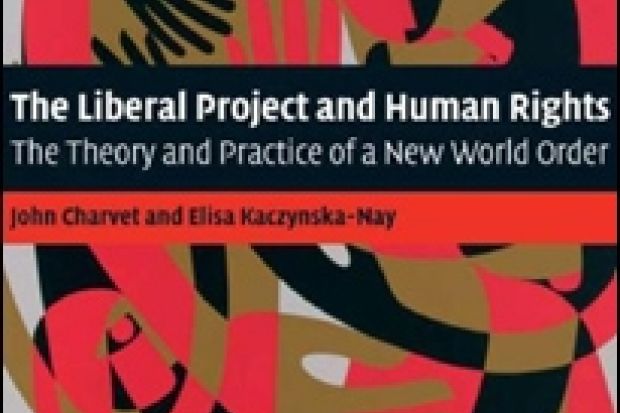The Liberal Project is unique in its contextualisation of the global human rights regime in "an evolving international society of sovereign states", a society itself underpinned by liberal assumptions. It provides critical insights and could become a key work in the field.
The first part of the book charts the historical development of the liberal tradition and the growth of universalism within the context of international society. The section on the United Nations is thorough and insightful, covering all the important declarations and covenants on human rights. John Charvet and Elisa Kaczynska-Nay examine in detail key debates on self-determination, the right to development and women's international human rights.
The chapter on the implementation of international human rights legislation, treaties and declarations is particularly noteworthy. UN organs responsible for such work are situated in their historical context, and their work in the postwar period is evaluated. The UN General Assembly, the Economic and Social Council, the treaty-based committees and regional regimes and the recently morphed Human Rights Council are key focuses here. Recent experience of the workings of this last body leave the authors "sanguine", although they share with Human Rights Watch the view that "continuing to ignore the grave human rights abuses in places like Burma and Somalia is unacceptable". Here, however, the critique could have gone deeper.
A more notable problem with this chapter is the omission of a dedicated section on the role of the Security Council. It has been argued by Sydney Dawson Bailey and by Bertrand Ramcharan that this body - which, given its law-making power, is certainly the most powerful of all the UN institutions - is singularly important, and it surely should be discussed in greater detail.
The council's role in human rights implementation is, however, implicit in the book's excellent discussion on the controversial theme of ethics and foreign policy, which incorporates detailed and impressive elaboration of divisive debates around the concepts of humanitarian intervention and the responsibility to protect (R2P) that have developed since the end of the Cold War.
Reviewing the influential International Commission on Intervention and State Sovereignty report on R2P - endorsed in the 2005 World Summit Outcome Document - the authors say "the proposal undoubtedly reflects a growing (and welcome) trend in international relations to accept, in principle at least, that a state's sovereignty in the field of human rights is not unlimited and can be subject to certain conditions". But they are savvy about the level of cynicism on the part of certain states that participate in various implementation bodies of the UN, the most notable recent example being the Human Rights Council, and say "it is easier for them to accept the norms and not follow them than to dissent openly".
The authors recognise the impact that engagement of oppressive states with human rights instruments can have: they cite the Soviet Union's signing of the Helsinki Accords as a classic example of a human rights agreement providing strong leverage for change.
On international criminal justice, the authors rightly identify an "enforcement revolution" and examine some of the main international tribunals, albeit in less depth than is warranted. Surprisingly, Charvet and Kaczynska-Nay take a somewhat ill-judged view of the International Criminal Tribunal for the former Yugoslavia (ICTY), which seems to jar with the general thrust of The Liberal Project. The tribunal is perceived by many, say the authors, to have dispensed "victor's justice" and they contend that "it is unlikely that the ICTY's verdicts will ever be regarded as impartial". Rather than the weak authority provided for these opinions, the authors should have furnished evidence relating to the specific verdicts they, or others, find suspect. The rigorous appeals procedures and generally timid indictments policy of various ICTY chief prosecutors cited by various critics suggests that, in fact, quite the opposite reality pertains.
The final part of the book details the theoretical critiques levelled at the liberal project. The arguments stemming from particular Western values (utilitarian, communitarian, Marxist and authoritarian) and non-Western values (Islamic, Confucian, Hindu, Buddhist, cultural relativist/East Asian) are examined in detail. The authors supply a robust vindication of liberalism, searching for compatibilities with its apparent opponents in the true spirit of that political philosophy.
Notwithstanding the qualifications noted above, The Liberal Project is a major work of synthesis and an admirably trenchant argument in defence of liberal values and practices. It is an invaluable critical and comprehensive reference tool for any activist, student or human rights scholar.
The Liberal Project and Human Rights: The Theory and Practice of a New World Order
By John Charvet and Elisa Kaczynska-Nay. Cambridge University Press. 446pp, £45.00 and £17.99. ISBN 9780521883146 and 709590. Published 20 November 2008
Register to continue
Why register?
- Registration is free and only takes a moment
- Once registered, you can read 3 articles a month
- Sign up for our newsletter
Subscribe
Or subscribe for unlimited access to:
- Unlimited access to news, views, insights & reviews
- Digital editions
- Digital access to THE’s university and college rankings analysis
Already registered or a current subscriber? Login
